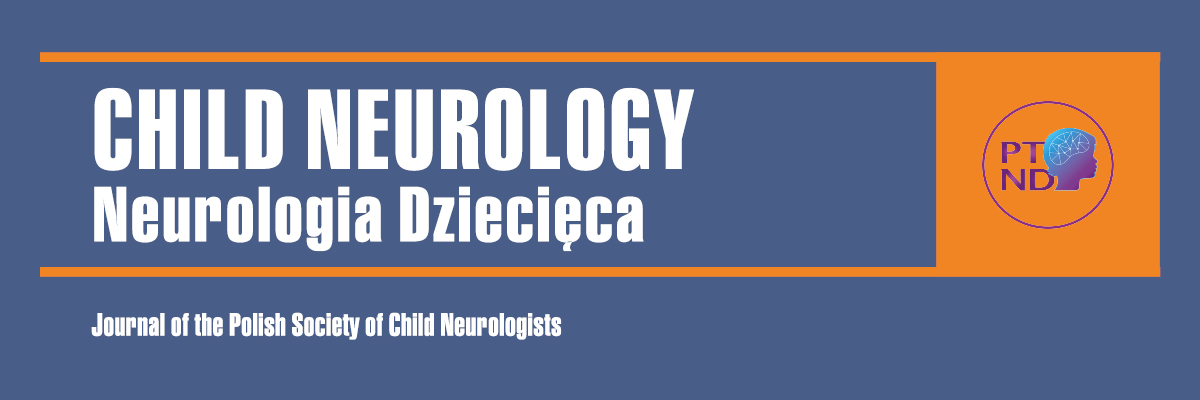Research on the treatment of Rett syndrome
Abstract
Rett syndrome (RS) is a genetically determined nerodevelopmental disorder that mainly affects females. The most common cause is a mutation in the MECP2 gene on the long arm
of the X chromosome. In the phenotype of the syndrome, dominant symptoms from the nervous system are observed, such as speech and motor regression, stereotypical hand movements, intellectual disability, seizures and breathing disorders. Clinical manifestation also includes
the skeletal system (short stature, scoliosis, osteoporosis) and the digestive system (gastroesophageal reflux). The syndrome was first described in 1965r. Research has been conducted for many years
on various forms of therapy for patients with RS. Due to variety of symptoms, the impact
of non-pharmacological actions and substances with very different mechanisms of action were assessed, using both previously known preparations, such as glatiramer acetate, cannabinoids, magnesium, L-carnitine, statins, as well as creating new molecules. Research led to FDA registration
in march 2023 of the first drug for RS therapy, trofinetide.
Keywords: Rett syndrometrofinetideNGN-401glatiramer acetatecannabinoidssarizotan
References
- Midro AT. Zespół Retta – postępy badań nad patogenezą. Neurol Dziec. 2010; 19(38): 55–63.
- Szulwach KE, Li X, Smrt RD, et al. Cross talk between microRNA and epigenetic regulation in adult neurogenesis. J Cell Biol. 2010; 189(1): 127–141.
- Midro AT. Genetyczne podłoże zespołu Retta- gen MECP2. Neurol Dziec. 2001; 10(19): 6–0.
- Steinborn B. Neurologia wieku rozwojowego. PZWL, Warszawa 2017: 61.
- Ellaway C, Christodoulou J, Ellaway C, et al. Rett syndrome: clinical update and review of recent genetic advances. J Paediatr Child Health. 1999; 35(5): 419–426.
- Chahrour M, Zoghbi HY. The story of Rett syndrome: from clinic to neurobiology. Neuron. 2007; 56(3): 422–437.
- Harris E. Trofinetide Receives FDA Approval as First Drug for Rett Syndrome. JAMA. 2023; 329(14): 1142.
- Dziwota E, Fałkowska U, Adamczyk K, et al. Silent angels the genetic and clinical aspects of Rett syndrome. Current Problems of Psychiatry. 2017; 17(4): 282–296.
- Neul JL, Kaufmann WE, Glaze DG, et al. RettSearch Consortium. Rett syndrome: revised diagnostic criteria and nomenclature. Ann Neurol. 2010; 68(6): 944–950.
- Giacometti E, Luikenhuis S, Beard C, et al. Partial rescue of MeCP2 deficiency by postnatal activation of MeCP2. Proc Natl Acad Sci U S A. 2007; 104(6): 1931–1936.
- Rose SA, Djukic A, Jankowski JJ, et al. Aspects of Attention in Rett Syndrome. Pediatr Neurol. 2016; 57: 22–28.
- Buchanan CB, Stallworth JL, Joy AE, et al. Anxiety-like behavior and anxiolytic treatment in the Rett syndrome natural history study. J Neurodev Disord. 2022; 14(1): 31.
- Brunetti S, Lumsden DE. Rett Syndrome as a movement and motor disorder - A narrative review. Eur J Paediatr Neurol. 2020; 28: 29–37.
- Haas RH, Rice MA, Trauner DA, et al. Therapeutic effects of a ketogenic diet in Rett syndrome. Am J Med Genet Suppl. 1986; 1: 225–246.
- Djukic A, Holtzer R, Shinnar S, et al. Pharmacologic treatment of Rett syndrome with glatiramer acetate. Pediatric Neurology. 2016; 61: 51–57.
- Khwaja OS, Ho E, Barnes KV, et al. Safety, pharmacokinetics, and preliminary assessment of efficacy of mecasermin (recombinant human IGF-1) for the treatment of Rett syndrome. Proc Natl Acad Sci U S A. 2014; 111(12): 4596–4601.
- Smith-Hicks CL, Gupta S, Ewen JB, et al. Randomized open-label trial of dextromethorphan in Rett syndrome. Neurology. 2017; 89(16): 1684–1690.
- Buchovecky CM, Turley SD, Brown HM, et al. A suppressor screen in Mecp2 mutant mice implicates cholesterol metabolism in Rett syndrome. Nat Genet. 2013; 45(9): 1013–1020.
- Abdala AP, Bissonnette JM, Newman-Tancredi A. Pinpointing brainstem mechanisms responsible for autonomic dysfunction in Rett syndrome: therapeutic perspectives for 5-HT1A agonists. Front Physiol. 2014; 5: 205.
- Abdala AP, Lioy DT, Garg SK, et al. Effect of Sarizotan, a 5-HT 1a and D2-like receptor agonist, on respiration in the mouse models of Rett Syndrome. Am J Respir Cell Mol Biol. 2014; 50(6): 1031–1039.
- Cheng H, Du C, Zhang Y, et al. Potent hERG channel inhibition by sarizotan, an investigative treatment for Rett Syndrome. J Mol Cell Cardiol. 2019; 135: 22–30.
- Golub V, Reddy DS. Cannabidiol therapy for refractory epilepsy and seizure disorders. Adv Exp Med Biol. 2021; 1264: 93–110.
- Mouro FM, Miranda-Lourenço C, Sebastião AM, et al. From Cannabinoids and Neurosteroids to Statins and the Ketogenic Diet: New Therapeutic Avenues in Rett Syndrome? Front Neurosci. 2019; 13: 680.
- Shannon S, Lewis N, Lee H, et al. Cannabidiol in anxiety and sleep: a large case series. Perm J. 2019; 23.
- Kimberley Trant, Executive Director, Patient Advocacy and Engagement Neurogene. www.neurogene.com (20.05.2023).
- Glaze DG, Neul JL, Kaufmann WE, et al. Rett 002 Study Group. Double-blind, randomized, placebo-controlled study of trofinetide in pediatric Rett syndrome. Neurology. 2019; 92(16): e1912–e1925.






